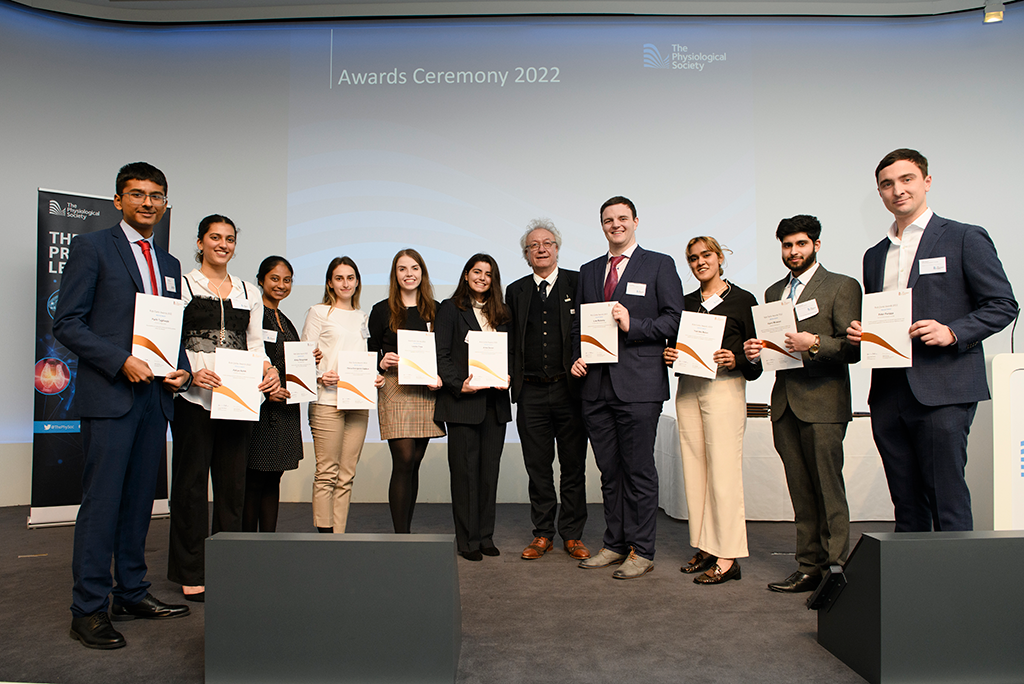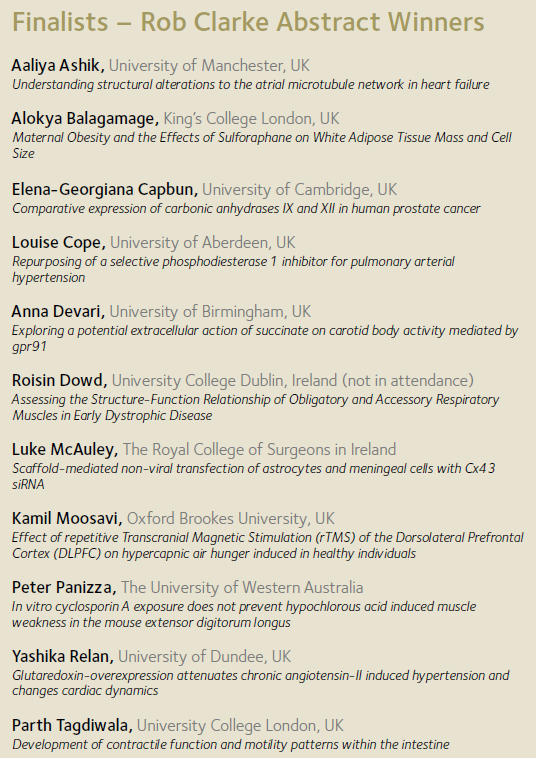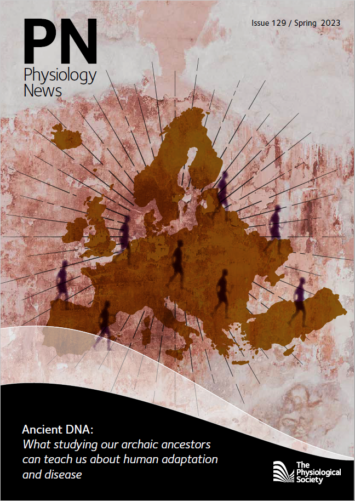
Physiology News Magazine
Congratulations to our 2022 Rob Clarke Awards Winners
News and Views
Congratulations to our 2022 Rob Clarke Awards Winners
News and Views
The Rob Clarke Awards were one of the highlights of the Member Forum held on Friday 2 December 2022. The award recognises excellence in undergraduate physiology projects.
Last year, 11 students were shortlisted for an Abstract Award and invited to present a poster at the Member Forum for final judging. The judges were impressed with all the finalists but receiving the overall highest score was Elena-Georgiana Capbun from University of Cambridge, UK who presented her poster titled “Comparative expression of carbonic anhydrases IX and XII in human prostate cancer”. The judges were impressed with Elena-Georgiana for the huge amount of work undertaken, the diverse techniques used and the depth of her knowledge on the topic, which she clearly presented.
We interviewed the winner and runners up to find out more about their projects. They share the inspiration behind their research and their experience of presenting to a panel of judges.
Award winner

Elena-Georgiana Capbun
University of Cambridge, UK
My project focused on the “Comparative expression of carbonic anhydrases IX and XII in human prostate cancer”, as potential biomarkers used in risk stratification, to allow better targeting of treatment with the intent of improving success and minimising adverse effects associated with therapy for indolent phenotypes. This was my first research project, completed during my intercalated year at university. Although challenging at times, given the amount of work and diverse techniques undertaken, I thoroughly enjoyed this experience: reading around the subject, thinking about data analysis, the significance of our findings and future paths that can be undertaken. I am thankful for the opportunity to work with my supervisor and other experts in histopathology and the field of carbonic anhydrases.
The poster presentation was enjoyable, from meeting other students and learning about their work, to presenting and being questioned by the panel of judges. It was an honour to be able to present my work to experts, to be listened to and questioned in a way in which interest was shown and ideas were discussed. The feedback from the judges was encouraging and it is a privilege to receive the award.
Motivated by my experience working on this project, I would like to work on clinical research and I am interested in pursuing a career in surgery.
Runner up
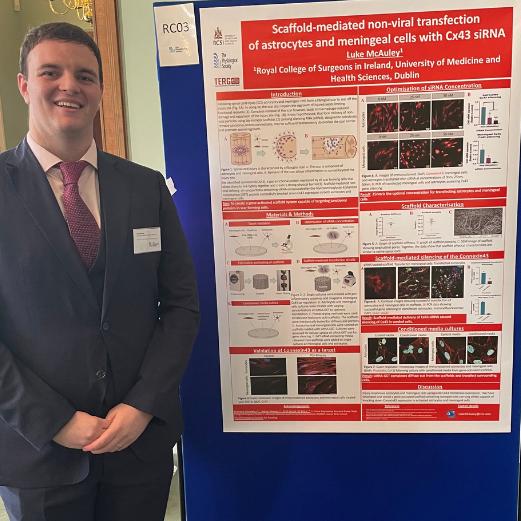
Luke McAuley
Royal College of Surgeons in Ireland
My project looked at ways to promote the regrowth of cells to improve healing and recovery following a spinal cord injury. To achieve this, we devised a scaffold-based delivery system capable of administering therapeutics directly to the injury site, which reduced scarring and promoted regrowth. I am a medical student and an avid rugby player, a sport where head, neck and spinal injuries are common. So, I was keen to research injury prevention and possible therapeutics leading to better outcomes following a spinal injury. I was fortunate to get the opportunity to partake in an eight-week summer project within the Tissue Engineering Research Group (TERG) Spinal Cord Injury team.
The poster presentation was an amazing experience and excellent learning opportunity for me personally. I had never presented to a panel of judges before and so was a little nervous to start. As the day went on, however, I grew in confidence, helped by the enthusiasm shown by both the judges and The Physiological Society members that came to view my poster and ask questions. Their questions made me think about alternative approaches to my work and consider other processes that would improve the efficiency and quality of the results.
The summer project has guided my decision to specialise in Orthopaedics. It has highlighted for me the need for further research into spinal cord injury repair therapeutics and the need for clinicians who are willing to bring these new revolutionising technologies to trial in their patients.
Runner up
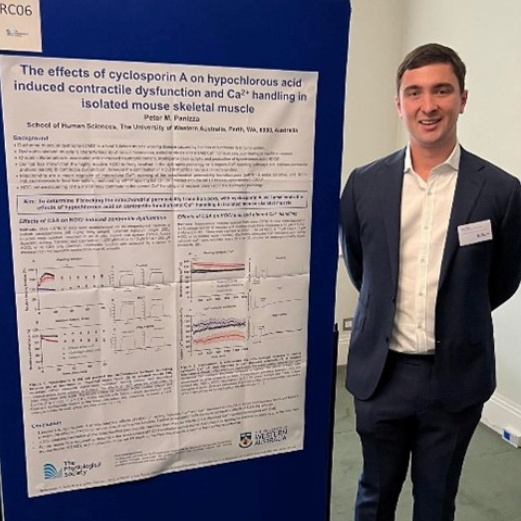
Peter Panizza
The University of Western Australia
My research focused on developing our understanding of the progression of Duchenne muscular dystrophy, with a particular focus on the aetiology of mitochondrial dysfunction in the pathology. Once I learnt about the devastating effects of this disease, I was drawn to research in this field, especially as I can relate to those affected as it affects primarily young males.
This was my first presentation of original research to a room full of accomplished scientists. It was truly an amazing and humbling experience. Leading up to my poster presentation I was quite nervous, however also extremely excited for the opportunity. When my presentation began, I started to relax as the judges were encouraging and patient. The conversations I had with judges during and after my presentation were stimulating and provided me with some new ideas for my future research. I thoroughly enjoyed the experience and the opportunity to network with the other presenters and more experienced researchers.
This project has deepened my interest in skeletal muscle disease and it is the field I wish to focus my career on. I am continuing my research into muscular dystrophy and building upon the interesting results of this project through an honours programme at the University of Western Australia. Next year I plan to apply to undertake a PhD.
